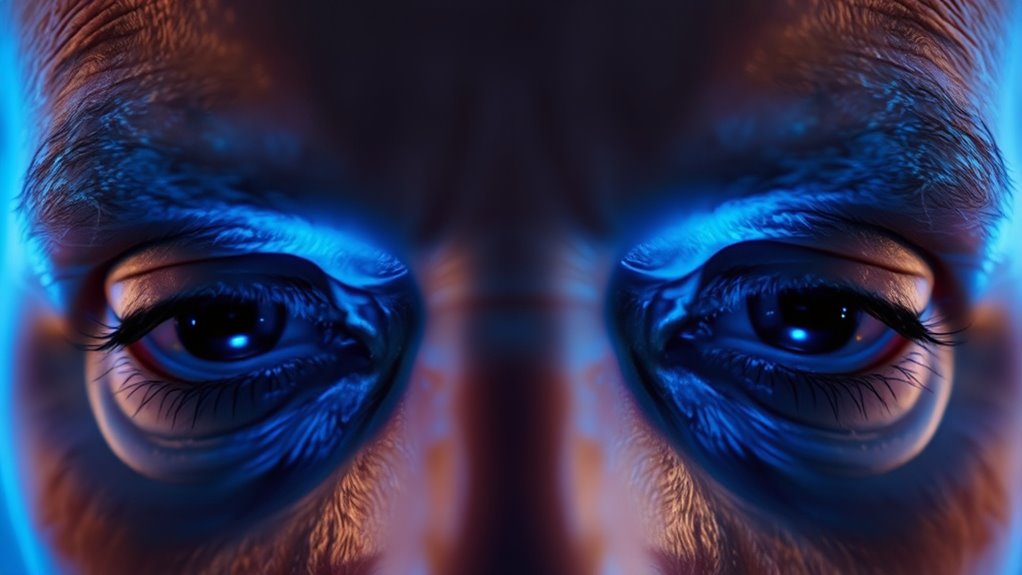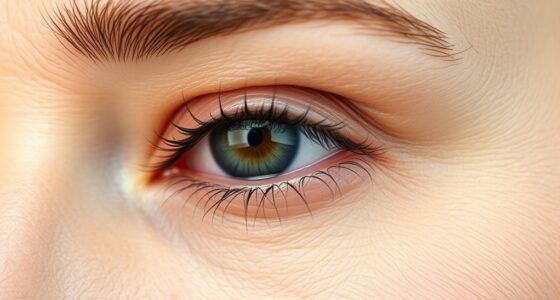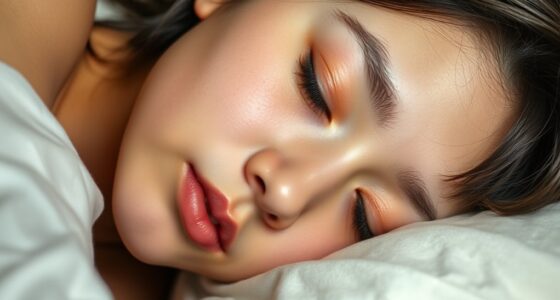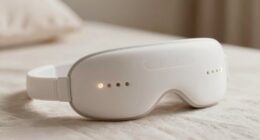Extended screen time exposes your eyes to blue light, which can cause fatigue and lead to dark circles, making you look older and more tired. Blue light also disrupts your sleep, reducing melatonin levels and worsening under-eye shadows. Over time, this strain accelerates aging signs around your eyes. By understanding how blue light impacts your eye health, you’ll discover simple ways to protect yourself and maintain a youthful, refreshed appearance. Keep going to find out how to make a difference.
Key Takeaways
- Excess blue light from screens can cause eye fatigue and dark circles by dilating blood vessels under the eyes.
- Prolonged screen time disrupts sleep by inhibiting melatonin, worsening dark circles and eye aging signs.
- Blue light exposure increases skin and eye strain, potentially accelerating signs of aging around the eye area.
- Using blue light filters and taking regular breaks reduces eye fatigue and minimizes dark circles caused by fatigue.
- Maintaining good sleep hygiene and limiting screen time before bed can help preserve youthful eye appearance.
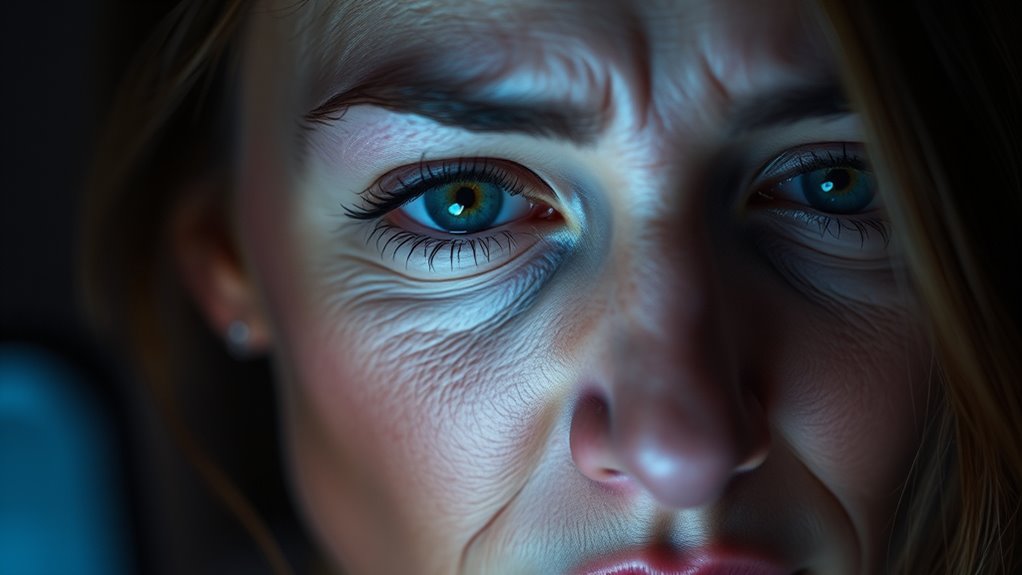
Many people overlook the impact of blue light exposure on their skin, especially around the delicate eye area. But it’s not just your skin that suffers; your eyes are also at risk. Extended screen time exposes you to blue light, which can lead to eye fatigue and disrupt your sleep patterns. When you stare at screens for hours, your eyes work harder to focus, causing strain and discomfort. This constant effort can make your eyes feel tired, dry, and sensitive, leading to headaches and blurred vision. Over time, this eye fatigue can contribute to the development of dark circles, as tired eyes often appear more sunken and shadowed.
Blue light’s effect on sleep disruption is equally concerning. When you’re exposed to blue light late into the evening, it inhibits the production of melatonin—the hormone responsible for regulating sleep. Without enough melatonin, falling asleep becomes harder, and your sleep quality diminishes. Poor sleep not only leaves you feeling exhausted but also makes dark circles more prominent. When your body doesn’t get enough restorative sleep, blood vessels under your eyes can dilate, resulting in a darker, more tired appearance. This creates a cycle where screen exposure leads to sleep issues, which then worsen the appearance of dark circles.
If you spend a lot of time on your devices, it’s essential to be mindful of blue light’s effects. Take frequent breaks using the 20-20-20 rule: every 20 minutes, look at something 20 feet away for at least 20 seconds. This helps reduce eye strain and gives your eyes a chance to relax. You can also consider using blue light filters on your devices or wearing glasses with blue light blocking lenses. These tools can help minimize blue light exposure and ease eye fatigue, especially during long work sessions or late-night browsing.
Creating a healthy screen routine can also improve your sleep. Try to avoid screens at least an hour before bed, and establish a calming nighttime routine to help your body wind down naturally. Prioritizing good sleep hygiene will help restore your melatonin levels and reduce dark circles caused by fatigue. Additionally, incorporating air purifiers into your living space can help improve indoor air quality, which may further support your overall health and well-being. Remember, protecting your eyes from blue light isn’t just about preventing immediate discomfort; it’s about safeguarding your overall eye health and maintaining a youthful, refreshed appearance. Being proactive with these habits can make a noticeable difference in how your eyes look and feel over time.
Frequently Asked Questions
Can Blue Light Cause Long-Term Eye Damage?
You’re wondering if blue light effects can cause long-term eye damage. Currently, research suggests that blue light mainly contributes to eye strain and discomfort during screen time, rather than permanent damage. While prolonged exposure may lead to fatigue, there’s no strong evidence linking blue light to serious, lasting harm. To protect your eyes, take regular breaks and adjust screen settings, but rest assured that daily blue light effects won’t likely cause long-term damage.
Do Dark Circles Indicate Underlying Health Issues?
You might notice dark circles and wonder if they signal health issues. Coincidentally, nutritional deficiencies and sleep disorders often cause puffiness and discoloration around your eyes. While stress and fatigue play roles, persistent dark circles could hint at underlying problems like anemia or allergies. If they linger despite good sleep, consider consulting a healthcare professional to rule out nutritional or health concerns, ensuring your eyes stay healthy and vibrant.
How Much Screen Time Is Safe Daily?
You should follow recommended screen time guidelines to protect your eyes. Experts suggest limiting daily screen use to about two hours for leisure and taking regular breaks to prevent digital eye strain. If you find yourself experiencing dryness, headaches, or blurred vision, cut back and practice the 20-20-20 rule—every 20 minutes, look at something 20 feet away for 20 seconds. Your eyes will thank you!
Are There Specific Glasses That Block Blue Light Effectively?
You might think all blue light blocking glasses are the same, but some offer better UV protection and filtering. Look for glasses specifically designed with high-quality blue light blocking lenses that also shield against UV rays. These glasses can reduce eye strain and protect your vision during long screen sessions. Investing in a pair with proven effectiveness guarantees you’re truly safeguarding your eyes, not just wearing stylish frames.
Do Dark Circles Worsen With Age Regardless of Screen Use?
As you age, dark circles often worsen due to age-related thinning of the skin and pigmentation changes around your eyes. These factors make blood vessels more visible and increase discoloration, regardless of your screen time habits. While screen use can contribute to eye strain, it’s the natural aging process that primarily causes dark circles to become more prominent over time. Taking care of your skin can help minimize their appearance.
Conclusion
As you scroll through screens, remember you’re painting shadows under your eyes with each glowing pixel. While blue light might not be a villain, it’s like a thief stealing your sleep’s quiet lullaby, deepening dark circles and aging your eyes. Stay mindful of your screen time, and give your eyes a break—let them rest like a gentle night’s sleep. Protect your vision now, so your future self can gaze into the world with youthful sparkle, not faded shadows.
